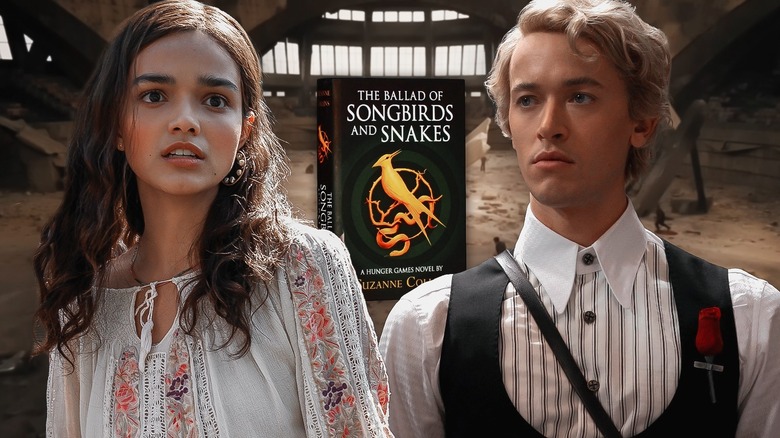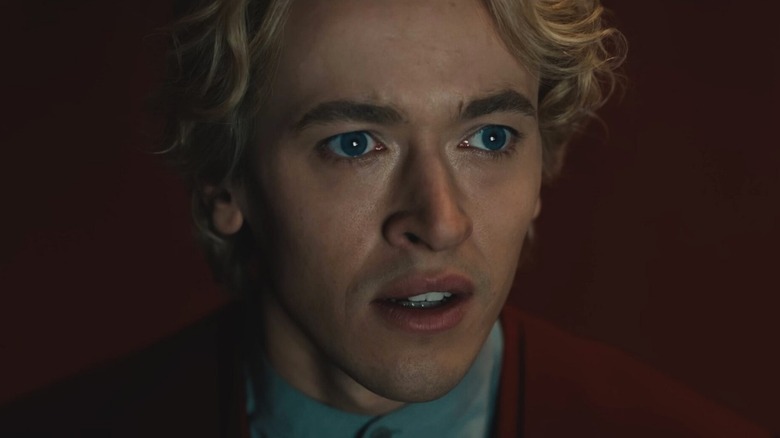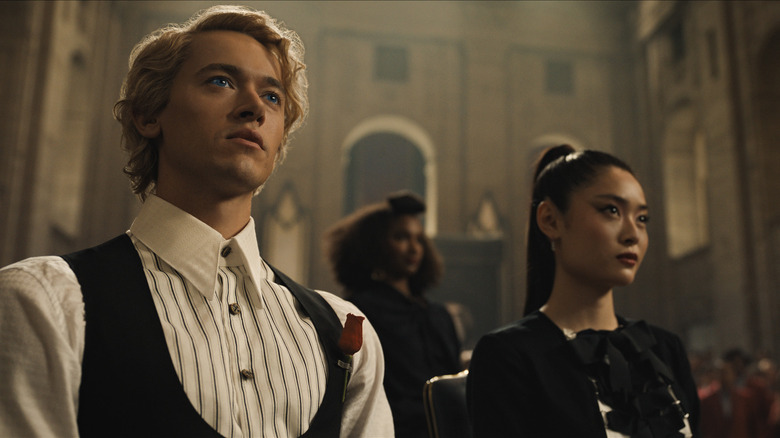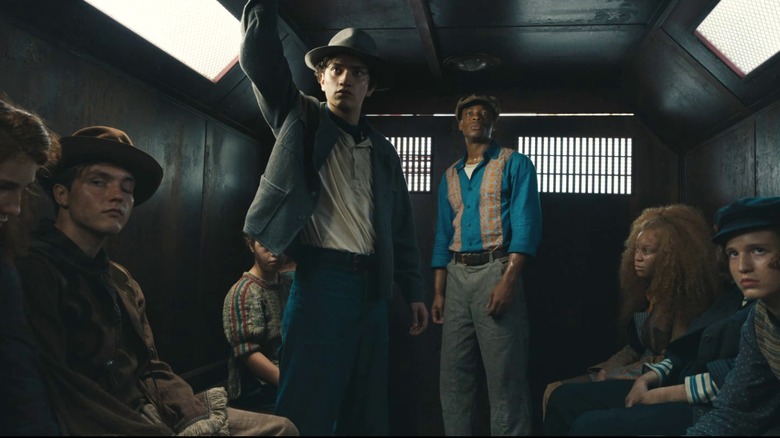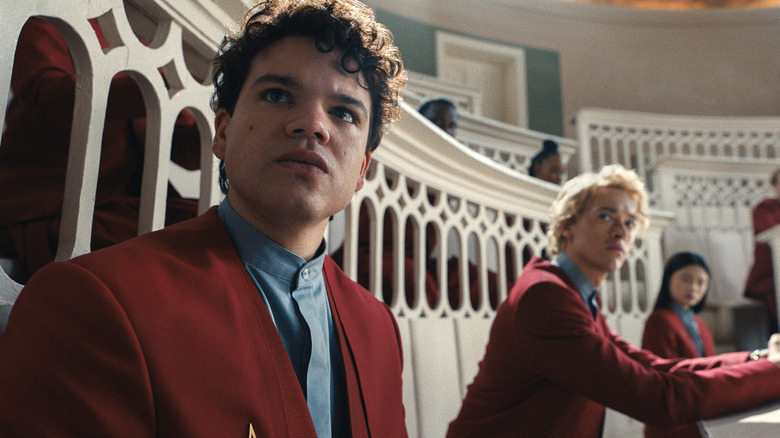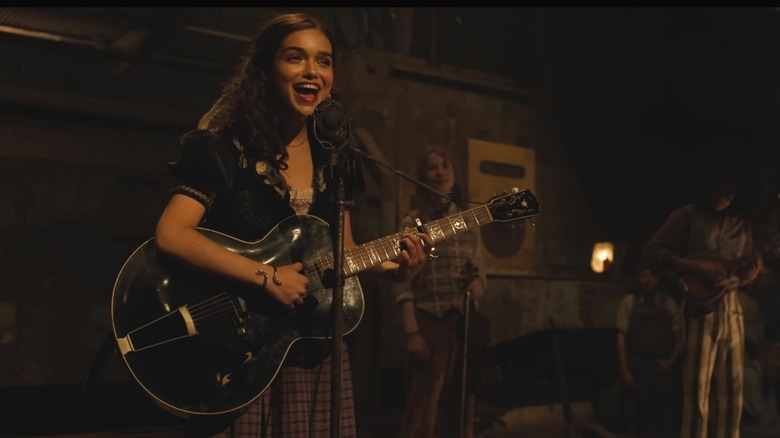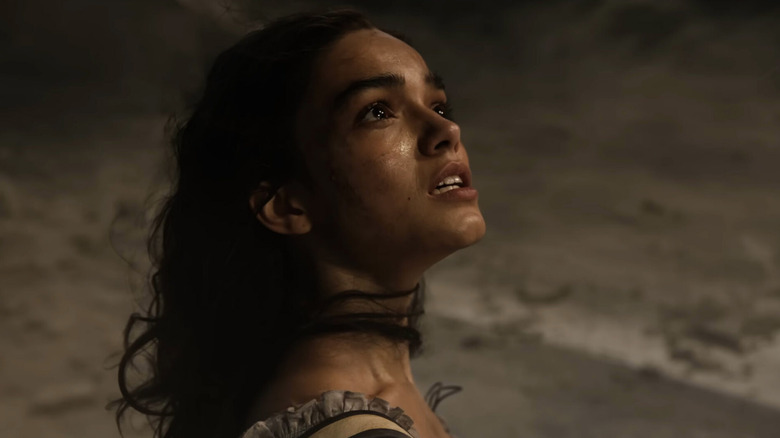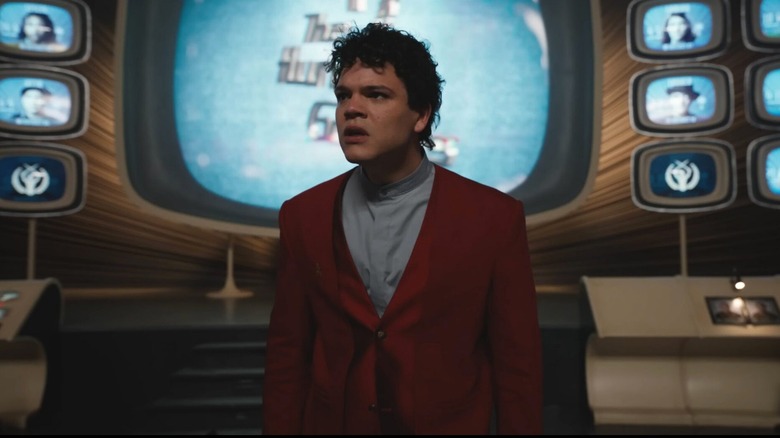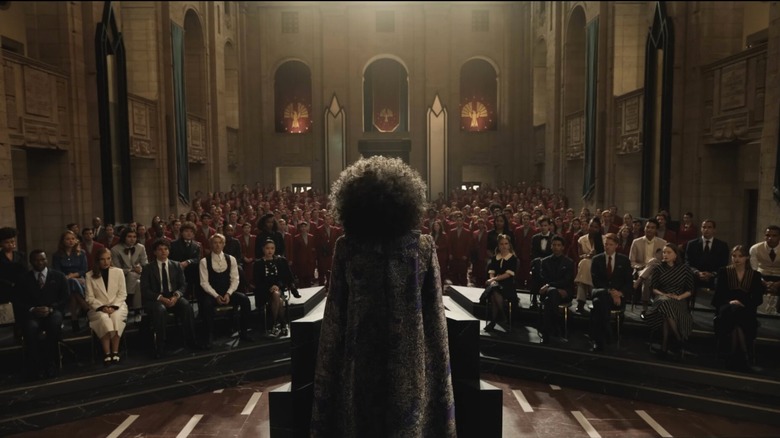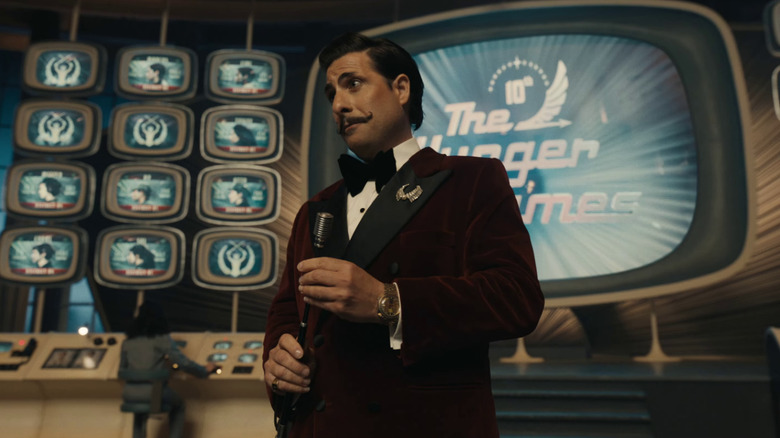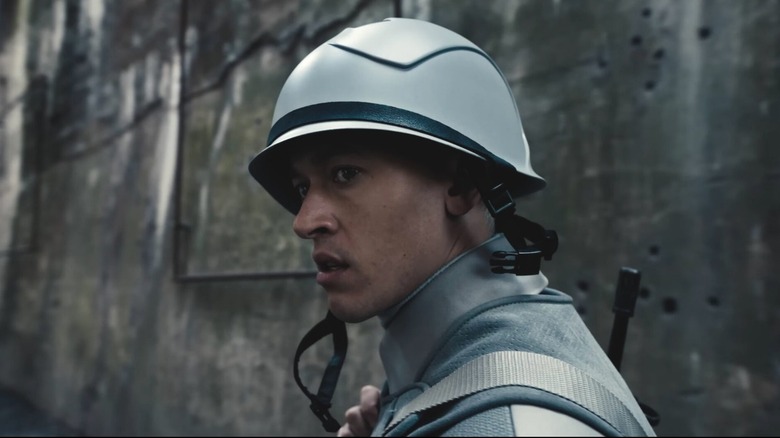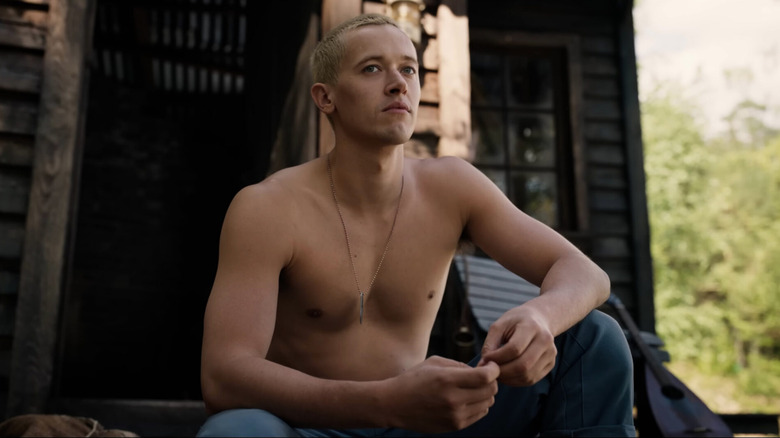Biggest Differences Between The Hunger Games: The Ballad Of Songbirds & Snakes Book And Movie
Contains spoilers for "The Hunger Games: The Ballad of Songbirds & Snakes"
It's been eight years since the original "Hunger Games" film series concluded with its fourth installment, "The Hunger Games: Mockingjay – Part 2." Based on the young adult novels penned by Suzanne Collins, "The Hunger Games" franchise became a launching pad for the 2010 young adult dystopian film craze, which has since slowly died out. Nevertheless, that hasn't stopped the original minds behind the books and films from bringing us an overdue addition to the series all these years later. The prequel to the series "The Hunger Games: The Ballad of Songbirds & Snakes" welcomes viewers back to Panem 64 years before the events of the first film for the 10th annual Hunger Games. The man who we come to know as the president of Panem, Coriolanus Snow (Tom Blyth), has yet to cross the line into evil as we follow his origin story as a budding Capitol Academy student looking to leave his mark.
In contrast to other adaptations, the active involvement of author Collins in the entire film series has proven to be a significant advantage, resulting in a more faithful representation of the original story. However, in adapting any literary work for the screen, necessary adjustments must be made to effectively convey the narrative visually, as was the case for "The Hunger Games: The Ballad of Songbirds & Snakes." The following examples are among the biggest differences between "The Hunger Games: The Ballad of Songbirds & Snakes" as a novel and its film adaptation.
Pluribus Bell was cut
In the expansive ensemble cast of "The Hunger Games: The Ballad of Songbirds & Snakes," it might surprise you to discover that several supporting characters from the book didn't make it to the movie. Among those omitted was Pluribus Bell, Coriolanus' dependable neighbor. He shared a close bond with the Snow family during the First Rebellion, providing them with crates of dried lima beans. Pluribus, an ex-musician and club owner turned black-market dealer, even supplied Coriolanus with a guitar for Lucy Gray's (Rachel Zegler) TV performance before the games.
Known for his generosity and compassion, many viewers were disappointed by Pluribus's absence in the film. Despite this, the omission had minimal impact on the overall narrative. While Lucy Gray does acquire a guitar in the movie, the details of how are left unexplored. In August 2022, producer Nina Jacobson addressed this change in response to an X, formerly known as Twitter, user's inquiry about Pluribus's role in the film, writing, "Sadly no room for Pluribus in the movie which is a bummer for the reason you said," which included his significance to Snow's family and the fact that he's a canonical LGBT character.
Clemensia's role was reduced
Coriolanus' classmate Clemensia (Ashley Liao) underwent notable changes in her portrayal from the book to the movie. After partnering with Coriolanus to draft a proposal for Dr. Gaul (Viola Davis) on increasing viewership for the Hunger Games, Coriolanus ends up writing the paper himself as Clemensia is too distressed by the death of Arachne (Lilly Cooper) at the hands of her tribute Brandy (Luna Kuse). In the book, Arachne was initially intended to assist them, but this collaboration doesn't transpire in the movie.
When Dr. Gaul questions Coriolanus and Clemensia about the paper's authorship, Clemensia lies about her contributions. Suspecting her deception, Dr. Gaul tasks Clemensia with retrieving the paper from a batch of her mutt snakes. Unable to discern her scent from the paper, the snakes bite Clemensia, causing her to be taken away for treatment. Here, the similarities between the book and the movie diverge significantly. While the book delves into Clemensia's worsening condition and eventual release from the hospital to participate as a mentor in the games, the movie takes a different path, and Clemensia is never seen again. Director Francis Lawrence discussed the alteration in an interview with Digital Spy, noting, "The truth is, when you're distilling these things down, there's gonna be some attrition." He further remarked, "But we really stayed true to the spirit of the story, and I feel like the important things are all there."
The tribute deaths
Arguably, the most substantial difference between "The Hunger Games: The Ballad of Songbirds & Snakes" book and the movie lies in the alterations to tribute deaths. While characters such as Marcus (Jerome Lance), Bobbin (Knox Gibson), Coral (Mackenzie Lansing), and Jessup (Nick Benson) see relatively consistent portrayals between the two, others like Reaper (Dimitri Abold), Dill (Luna Steeples), Wovey (Sofia Sanchez), and Treech (Hiroki Berrecloth) meet different fates in the movie compared to their counterparts in the book. These deviations stem largely from the structural shifts in the progression of the games between the two mediums. One notable factor contributing to these changes is the timing of the deployment of Dr. Gaul's snakes. In the book, the snakes are unleashed earlier in the games, while in the movie, they make a late entrance and play a pivotal role in concluding the competition, ultimately leading to Lucy Gray's victory.
While in the book, Lucy Gray slips a snake down Treech's back to kill him, echoing her earlier reaping day antics, the movie takes a different approach, portraying Lucy Gray dusting poison on Treech's face through an air vent. Additionally, the film introduces a deviation in Lucy Gray's use of poison on Dill, an unintended act, while in the book, Dill succumbs to her tuberculosis. The source material also had Wovey falling victim to Lucy Gray's poison, yet in the movie, Wovey's demise is a result of the snakes introduced by Dr. Gaul. Finally, Reaper's demise serves as the concluding death in the book, where Lucy Gray poisons a puddle he drinks from. However, in the movie, his fate aligns with the others as he succumbs to the snakes.
Feeding the tributes was Sejanus's idea
In the lead-up to the games, the tributes are housed and exhibited at the abandoned Capitol Zoo, a departure from the treatment seen in the original films. In contrast, these tributes face harsher conditions, deprived of both food and water. However, the student who comes up with the idea for feeding the tributes differs between the book and the movie. In the film, Lucy Gray requests that Coriolanus bring them food, leading him to stash sandwiches from the Academy and enlist Sejanus (Josh Andrés Rivera) to join the effort. While certain key moments, like Marcus rejecting Sejanus' offerings and Brandy's fatal confrontation with Arachne, are retained, the zoo feeding scenes are more extensively portrayed in the books.
In the book, Coriolanus feels slightly upstaged when he discovers Sejanus distributing sandwiches made by his mother to the tributes. Nevertheless, he joins Sejanus in distributing the food and even encourages Capitol citizens to contribute to their favorite tributes. While the book depicts multiple visits to the zoo, this aspect is notably condensed in the movie.
A lack of the Covey
Lucy Gray Baird hails from the nomadic Covey family, once known for traveling the coast and performing musical acts before settling in District 12. The remaining Covey members in District 12 consist of Lucy Gray, her cousins Maude Ivory (Vaughan Reilly) and Barb Azure (Honor Gillies), Tam Amber (Eike Onyambu), and Clerk Carmine (Konstantin Taffet), the brother of former Covey member Billy Taupe (Dakota Shapiro). Coriolanus encounters the Covey during his peacekeeper training in District 12, but their portrayal in the film pales in comparison to the depth found in the book. The substantial interactions Coriolanus has with characters like Maude Ivory and Barb Azure in the book are entirely absent in the movie.
In the film, the Covey members are only shown performing on stage together or in the background during the lake scene, leaving the audience without the nuanced family dynamic explored in the book. Fortunately, one pivotal scene from the book remains in the movie, where Clerk Carmine presents Lucy Gray with a plant named Katniss — an unsubtle nod to future events.
The drones don't function as intended
In "The Hunger Games: The Ballad of Songbirds & Snakes," the film unveils the origins of the donation system employed within the Hunger Games. In the original films, Capitol citizens could contribute food and resources to their favored tributes using personal funds, a system that significantly prolonged the duration of the games and could act as the difference between life and death. However, the introduction of this system during the 10th annual Hunger Games reveals a less refined process. Notably, donations are delivered to tributes through drones deployed by mentors.
A significant deviation between the book and the movie lies in the functionality of these drones. Instead of operating as intended, the film depicts the drones malfunctioning, posing a new threat by forcefully flying and targeting tributes, thereby increasing the peril within the arena. In a creative twist not present in the book, Coriolanus exploits these malfunctioning drones to his and Lucy Gray's advantage. He strategically sends multiple drones to attack tributes who pose a threat to Lucy Gray. This deviation from the source material provides a fresh and clever approach to tribute deaths that the book never explored.
Sejanus's mom wasn't as involved
The complex family dynamics of the Plinths shed light on Sejanus's motivations to uphold a sense of moral righteousness. Originally from District 2, Sejanus and his parents relocated to the Capitol after amassing wealth from manufacturing weaponry during the First Rebellion. However, this newfound affluence and influence in the Capitol create tension, as Sejanus harbors resentment towards his father. Feeling like outsiders in the Capitol, both Sejanus and his mother yearn to return to their roots in District 2. Although their backstory is highlighted in the movie, the role of Sejanus's parents is notably diminished compared to the detailed portrayal in the books.
One notable omission from the film is Mrs. Plinth's famous cooking skills. In the books, her cooking plays a pivotal role in ensuring everyone is well-fed, from preparing sandwiches for the tributes to sending treats to District 12 during Sejanus and Coriolanus's peacekeeper training. Moreover, the movie alters key scenes, such as when Sejanus enters the arena during the Hunger Games. In the book, Mrs. Plinth discovers Sejanus in the arena on a TV screen after coming to the Snow residence looking for him. In the film, this moment is reshaped, with Mrs. Plinth appearing only after Sejanus escapes the arena to comfort her son. Finally, the movie eliminates a scene where Coriolanus meets with Mr. Plinth, hoping to be financially compensated for saving his son. Although audiences miss out on the complexity of the relationships and motivations at play, these changes do little to alter the overall narrative.
The Academy professors never appeared
Other supporting characters cut from the movie include the Academy professors Satyria Click, Agrippina Sickle, and Crispus Demigloss. Instead, Dr. Gaul and Casca Highbottom (Peter Dinklage) take on roles in pivotal scenes originally featuring these professors. For instance, the brainstorming session on increasing Hunger Games viewership, initially led by history professor Crispus Demigloss in the book, is altered in the movie, with Dr. Gaul and Highbottom taking center stage. The gymnasium mistress, Agrippina Sickle, is also replaced in scenes including the mentor and tribute questionnaire meeting and the arena tour.
A significant loss in the film is the absence of communications professor Satyria Click, who had a close relationship with Coriolanus. In the book, Click played a crucial role in securing one of the 24 mentor slots for Coriolanus and led the funeral for Arachne, a scene absent from the movie. Combining characters is nothing new for book-to-screen adaptations, and fortunately, "The Hunger Games: The Ballad of Songbirds & Snakes" was able to pull it off without any problems.
No interviews with the mentors
Lucretius "Lucky" Flickerman (Jason Schwartzman), the humble weatherman, amateur magician, and father of Caesar Flickerman, assumes the dual role of Capitol news reporter and the inaugural host of the Hunger Games, thereby replacing the character Lepidus Malmsey from the book. On top of reporting Capitol news, Lepidus was responsible for interviewing the mentors after the tribute had died in the Hunger Games. However, with Lepidus absent from the movie, the interviews must've proved too much in addition to Lucky's hosting responsibilities, because they ended up being axed from the film altogether.
Instead, mentors are instructed to leave immediately after their tribute dies without an interview. While a departure from the source material, this adjustment is a testament to the pragmatic choices made in adapting the narrative for the screen, showcasing Lucky's formidable presence without compromising the film's coherence. The absence of Lepidus exemplifies another successful integration of characters to streamline the cinematic experience.
Coriolanus's peacekeeper bunkmates are absent
Part III of "The Hunger Games: The Ballad of Songbirds & Snakes," titled "The Peacekeeper," undergoes significant truncation in the movie, with the decision to focus more of the 2 hours and 37 minutes runtime on the first two parts, "The Mentor" and "The Prize." Unfortunately, this reduction results in viewers missing the chance to meet Coriolanus's peacekeeper bunkmates, Smiley, Bug, and Beanpole, with whom he forms early friendships during training.
Smiley and Bug, originating from the Districts and having willingly enlisted as peacekeepers, provide Coriolanus with a new perspective on his situation, while Beanpole, hailing from the Capitol like Coriolanus, helps alleviate his sense of isolation along with Sejanus's presence. In the film, the roles of Smiley, Bug, and Beanpole become obsolete, given that Coriolanus dedicates his non-training moments to spending time with Lucy Gray and Sejanus. The movie's adaptation choices emphasize these central relationships, albeit at the expense of exploring the broader dynamics and interactions that enriched the original narrative.
Dr. Kay didn't teach Coriolanus about Jabberjays and Mockingjays
Another crucial character central to Coriolanus' experience in District 12, Dr. Kay, didn't make the cut in the film. Dr. Kay, a scientist working under Dr. Gaul, played a significant role in leading the peacekeeper mission to collect wild military-grade jabberjays and their offspring, the mockingjays. In the book, it is Dr. Kay who educates Coriolanus about the history and functionality of jabberjays and mockingjays. This knowledge becomes instrumental in Coriolanus's decision to record Sejanus's rebellious plan and report him to Dr. Gaul.
While the movie retains the essential plot point of Coriolanus betraying Sejanus, Dr. Kay is noticeably absent. Instead, the responsibility of imparting information about the birds falls on Dr. Gaul in the film. Moreover, the extensive portrayal of Dr. Kay's involvement in capturing the birds, as depicted in the book, is condensed into a brief montage in the movie.
'Until the Mockingjay sings'
Lucy Gray's significant quote from the book, "The show's not over until the mockingjay sings," is notably absent in the movie. This singular phrase, echoed in various forms throughout the book, carries profound meaning and foreshadows future events in the original series. Its omission from the film's dialogue is regrettable, given its thematic resonance and connection to subsequent story developments.
The quote's significance lies in the fact that mockingjays, being the offspring of jabberjays and mockingbirds, mimic sounds they encounter, including melodies and voices. During public executions, mockingjays would repeat the final words of the victims, giving rise to the expression, "The show's not over until the mockingjay sings." This phrase becomes especially poignant for fans familiar with the franchise, as the mockingjay later evolves into the symbol of the Second Rebellion, guided by Katniss, who stands as the elderly Coriolanus's biggest threat in the original films.
